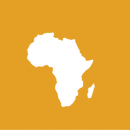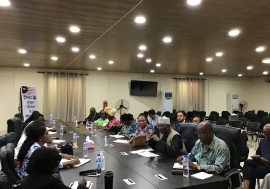Dr. Julitta Onabanjo was UN Population Fund (UNFPA) Regional Director for East and Southern Africa for 8 years. As she departs, she shares her reflections with Africa Renewal on an accelerated pathway towards justice, prosperity and equality for all. Here are the excerpts:

What are your thoughts on the East and Southern Africa region regarding Africa’s Agenda 2063 and the Sustainable Development Goals (SDGs)?
Home to more than 600 million people, UNFPA’s East and Southern Africa Region is a geographically, culturally and economically diverse region of 23 countries, stretching from the Red Sea in Eritrea all the way to the Cape of Good Hope in South Africa. Holding some of the world’s richest natural resources, as well as four upper middle-income and two high-income economies, the region continues to make large strides towards the ‘Africa We Want’.
With nearly 50 per cent of the population being under 18 years, the region’s young people are the greatest resource – with the potential to drive transformational outcomes for inclusive and sustainable development.
The International Conference on Population and Development - ICPD agenda - remains close to the region’s heart in securing an environment in which all individuals, particularly women and girls, can have universal access to sexual and reproductive health and rights, and be able flourish and accelerate progress towards a just, equal, prosperous and sustainable Africa.
However, there is much unfinished business in the region.
Despite the notable progress made on many fronts, the East and Southern African region harbors some of the continent’s most significant challenges, including gaps in healthcare provision, human rights and gender equality. These continue to impact heavily the lives and livelihoods of many people, especially women and youth, and to slow down progress towards the ‘Africa We Want’.
In the East and Southern Africa region:
- One in four women has an unmet need for family planning, representing 49 million women who wish to avoid pregnancy but are not using any modern contraceptive method.
- More than 77,000 maternal deaths occur every year, accounting for 66 per cent of all maternal deaths globally.
- Nearly a third of women have experienced physical or sexual violence.
- Two in five new HIV infections are among youths aged 15 to 24 years.
These obstacles are compounded by the impact of the COVID-19 pandemic, which has taken a toll on human life, strained health systems, and increased women and girls’ vulnerabilities to gender-based violence (GBV).

More than 60 per cent of the population in the region, including young people, have either lost all their income or have experienced reduced incomes since the onset of the pandemic, according to a 2021 study by UNFPA and UN Women ‘Impact of COVID-19 on Gender Equality and Women’s Empowerment in East and Southern Africa’.
If countries in the region are to achieve the goals of Agenda 2063, progress must be fast-tracked. But this acceleration will not happen without filling the resource gaps and stepping up political commitment at all levels to prioritize the needs of women and girls, even in the face of ongoing crises.
From my heart
At a personal level, reflections from the region will always have a special place in heart. Key lessons learnt are definitely life changing.
When I assumed the role of Regional Director, my intention was to make a lasting impact on underserved communities, in particular the region’s 182 million diverse and special young people between the ages of 10 to 24. I did my best to balance being of service and learning, as well as speaking and listening, throughout this journey.
Why are UNFPA’s three transformative results essential to set Africa on an accelerated pathway to prosperity, justice and equality for all?
As a medical doctor and public health specialist, it saddens me to note that in this day and age, women and girls still die from preventable causes during pregnancy and childbirth!
It is especially sad to know that many of our women and young people are unable to realize their basic human rights, including access to comprehensive sexual and reproductive health and rights, information and services.
If we, as a region, are to realize the aspirations of our people, there is need for an accelerated development narrative. If we cannot achieve the goals laid out in the ICPD Programme of Action, then it will be impossible to meet the SDGs – in particular Goal 3 on health, Goal 4 on education and Goal 5 on gender equality – as well as Africa’s Agenda 2063.
This is why we must make the right investments and keep working to accomplish three transformative goals of achieving:
- zero unmet need for family planning information and services,
- zero preventable maternal death, and
- zero sexual and gender-based violence and harmful practices against women and girls.
These transformative results have a direct impact on securing justice, equality and prosperity – the cornerstones for achieving the Agenda 2063 – the ‘Africa We Want’, as well as the SDGs principle of leaving no one behind.
The results encompass the empowerment, protection, health and wellbeing of women; as well as investments in young people – alongside harnessing technology and innovation, human capital development and domestic resource mobilization.
At regional level, UNFPA – together with other UN Agencies – works with governments and partners to directly achieve these goals.
During the eight years I have served as UNFPA Regional Director in the region, I have witnessed strong leadership in many of our countries.
Going forward, it is essential for stakeholders to work alongside governments to ensure policies and resources are in place and implemented to address sexual and reproductive health needs.
Innovative partnerships and coordinated investments are also key to attaining universal access to sexual and reproductive health and rights information and services, for securing the continent’s future prosperity.
How are emerging challenges presented by COVID-19 impacting progress towards the three transformative results?
Like all countries across the globe, the pandemic has exacerbated existing inequalities and vulnerabilities within countries in the region, hitting women and young people the hardest.
At the regional level, UNFPA continues to focus on expanding the possibilities for women and young people to lead healthy sexual and reproductive lives, across all the 23 countries in the region, by 2030.
The COVID-19 pandemic has not changed these transformative aspirations. The pandemic has, however, set back years of progress and its short, medium and long-term impacts could mean a reversal of significant gains made to guarantee the basic rights for women, men and young people if adequate measures are not taken to secure their health and well-being.
Despite noteworthy efforts to ensure continuity of essential health - including sexual and reproductive health services - in East and Southern African countries, during the first and second waves of the COVID-19 pandemic in 2020, in comparison to 2019:
- Outpatient attendance, including for adolescents, declined in most countries, by as much as 40 per cent in Eritrea and Kenya.
- Use of injectable contraceptives was particularly affected during the first COVID-19 wave, with significant decline in Tanzania, South Africa and Lesotho.
- HIV testing for pregnant women declined in many countries including in Botswana, Comoros and Eritrea; whilst home-based deliveries increased, which in turn increased the risk of maternal morbidity and mortality.
- The number of GBV cases at health facilities increased significantly in nearly all these countries.
While the pandemic has slowed down progress towards the SDGs, it also makes their achievement ever more urgent and necessary. As the crisis continues to evolve, rights-based humanitarian response and emergency plans, as well as enhanced coordination among partners, are key to identifying areas of greatest need and potential intervention.
Pregnancy and childbirth do not stop for pandemics
As such, the ultimate goal is to ensure continuity of life-saving sexual and reproductive health services and to defend the rights, safety and dignity of women and girls.
In the region, these priorities will continue to shape UNFPA’s work as we look forward to implementing the UNFPA Strategic Plan (2022–2025), opening up new paths to the future we envision: a future in which every pregnancy is wanted, every childbirth is safe, and every young person’s potential is fulfilled.
















